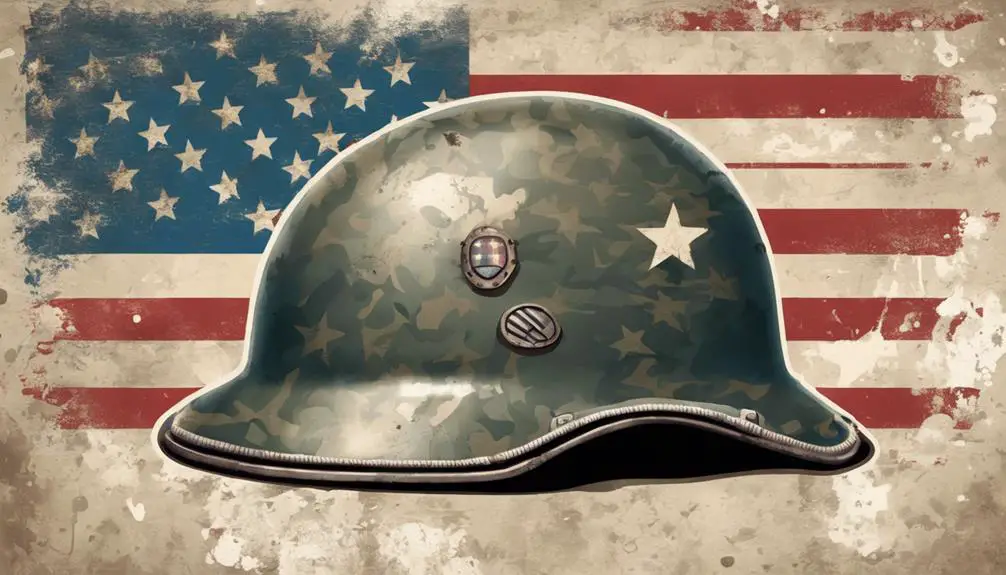As you immerse yourself in the world of 11B, you'll discover a unique language that's crucial to infantry culture. Born from the US Army's MOS system, 11B slang has evolved into a colloquialism that's both a badge of honor and a coping mechanism for frontline combat soldiers. You'll encounter battle cries like 'Oorah' and 'Hooah,' as well as phrases like 'Hurry up and wait' and 'Embrace the suck' that reflect the absurdity of military life. As you learn more about this specialized language, you'll uncover a world of humor, camaraderie, and combat zone lingo that's essential to communication and survival. There's more to uncover in this complex world of 11B slang.
The Origins of 11B Slang
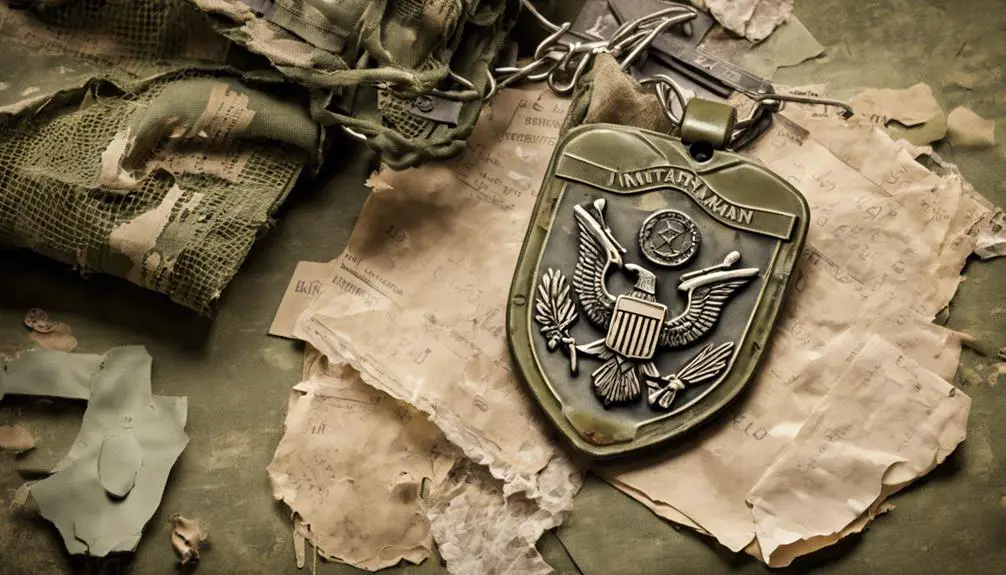
You've likely heard the term '11 Bravo' thrown around, but have you ever wondered where this military slang originated from? The answer lies in the historical roots of the US Army's Military Occupational Specialty (MOS) codes. In the 1960s, the Army introduced the MOS system to categorize soldiers' skills and job roles. Infantrymen were assigned the code '11B', which eventually became synonymous with frontline combat soldiers.
Cultural influences also played a significant role in shaping the term '11 Bravo'. During the Vietnam War, the 11B MOS code became a badge of honor among infantrymen, symbolizing their toughness and bravery. The term gained popularity as a way to identify and connect with fellow combat veterans.
Over time, '11 Bravo' evolved into a colloquialism, proudly worn by those who've served in the infantry. Today, it's a term that commands respect and camaraderie among military personnel and veterans alike.
Common Infantry Expressions
Beyond the 11B MOS code, infantrymen have developed a unique language that's both essential and expressive, with phrases that convey urgency, camaraderie, and humor. You'll often hear battle cries like 'Oorah' or 'Hooah' to motivate and energize teammates during intense situations. These chants not only boost morale but also serve as a form of communication, signaling the start of an operation or the need for caution.
In the field, humor is a crucial coping mechanism. You'll encounter field humor in the form of sarcastic remarks, jokes, or playful teasing. It helps to diffuse tension, relieve stress, and foster a sense of camaraderie. Phrases like 'Hurry up and wait' or 'Embrace the suck' highlight the absurdity of military life, making it more bearable. These expressions also serve as a way to poke fun at the military's bureaucratic nature, reminding you that, despite the chaos, you're not alone in this experience.
Slang for New Recruits
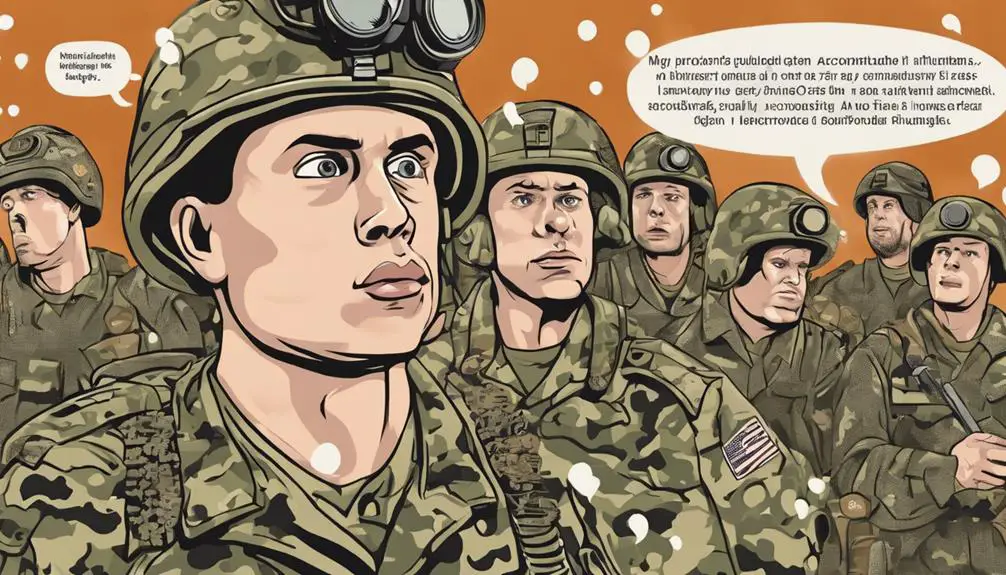
As a new recruit, you'll quickly learn that military slang is an essential part of fitting in and understanding the complex world of military culture. In Boot Camp, you'll be immersed in a world of acronyms, jargon, and colloquialisms that may seem intimidating at first, but will soon become second nature.
Here are a few essential terms to get you started:
- Drill Sergeant: Your instructor and mentor during Boot Camp, who'll push you to your limits and beyond.
- Ruck: Short for 'rucksack,' this refers to your backpack, which will become your constant companion.
- Chow: Food, which you'll be grateful for after a long day of training.
- Squad: Your team of fellow recruits, who'll become your support system and friends.
Mastering these terms will help you navigate the complexities of military life and earn you respect from your peers and superiors.
Combat Zone Lingo
When you deploy to a combat zone, you'll encounter a unique set of slang terms that are essential to understanding the nuances of military operations in a high-stress environment. In the heat of battle, clear communication is key, and using the right lingo can mean the difference between life and death.
Here are some examples of combat zone lingo:
| Term | Meaning |
|---|---|
| HOO-AH | Battle cry used to express excitement or motivation |
| OSOK | One Shot, One Kill (sniper's motto) |
| OORAH | Battle cry used to express enthusiasm or approval |
| FOB | Forward Operating Base (a temporary military base) |
| Haji | Enemy combatant or terrorist |
In a combat zone, war rhetoric is used to boost morale and intimidate the enemy. Battle cries like 'HOO-AH' or 'OORAH' are used to express enthusiasm and motivation, while terms like 'OSOK' are used to intimidate the enemy. Understanding these terms is essential to effective communication and success in a combat zone.
Radio Communication Codes
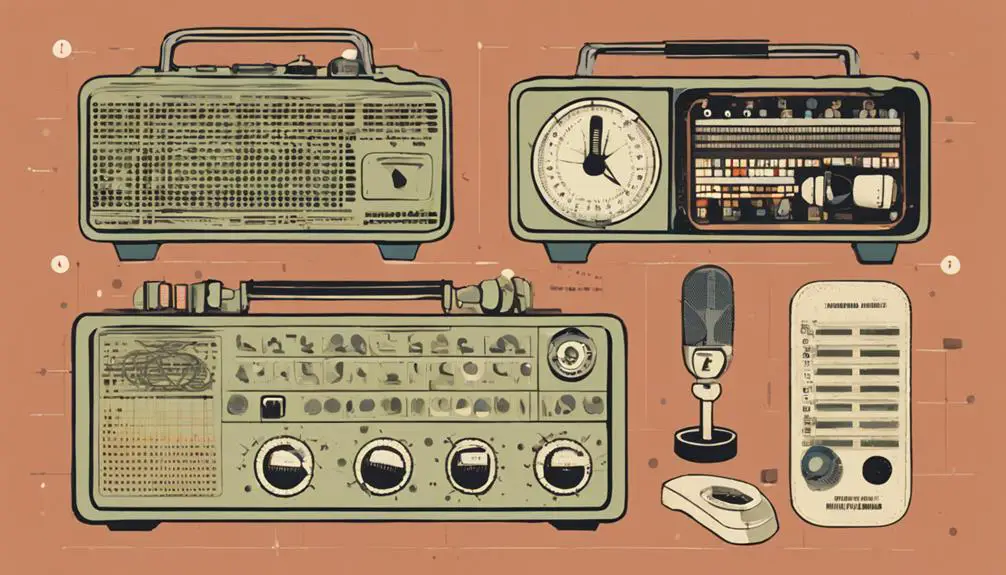
You'll depend heavily on radio communication codes to convey critical information quickly and accurately in high-pressure situations. In the heat of the moment, every second counts, and using the right codes can mean the difference between success and failure.
To guarantee clear communication, you'll use Phonetic Alphabets to clearly pronounce letters and numbers. This is especially vital when relaying sensitive information over Secure Frequencies.
Here are some essential radio communication codes to know:
- Phonetic Alphabets: Use standardized codes like Alpha, Bravo, Charlie to clearly pronounce letters and numbers.
- Secure Frequencies: Use encrypted channels to safeguard sensitive information from unauthorized access.
- Radio Checks: Conduct regular checks to confirm your equipment is functioning correctly.
- Code Words: Use pre-designated code words to convey critical information quickly and discreetly.
Infantry Insider Jokes
After relying on radio communication codes to get the job done, it's time to kick back and explore the lighter side of military culture – infantry insider jokes that only those in the trenches truly understand.
You've earned the right to laugh and poke fun at the quirks of military life. Infantry insider jokes are a way for soldiers to bond and relieve stress, often at the expense of their Battle Buddies.
Remember that guy who always seemed to get lost during navigation exercises in Boot Camp? Yeah, he's still getting lost – and his fellow soldiers are still making fun of him for it. These jokes are a way to cope with the chaos and uncertainty of combat, and they bring a sense of camaraderie to the team.
Unspoken Rules of 11B Speak
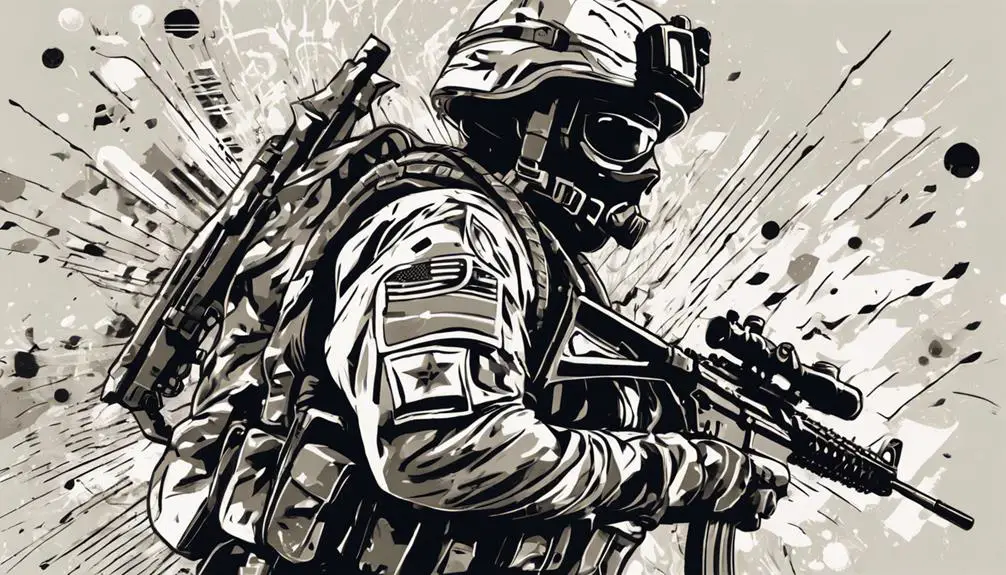
In the world of 11B, Infantrymen, certain unspoken rules govern the way you communicate, and understanding these rules can mean the difference between being 'in' or 'out' of the squad's inner circle. You see, 11B speak is more than just slang; it's a cultural phenomenon that reveals the intricate web of squad dynamics and cultural nuances.
Here are some unspoken rules to keep in mind:
- Earn your stripes: Don't pretend to be something you're not. Your fellow Infantrymen can spot a fake from a mile away.
- Keep it real: Avoid using overly complex language or jargon. Straight talk is respected; fluff talk is not.
- Know your role: Understand your place in the squad and communicate accordingly. Don't try to be someone you're not.
- Read between the lines: Pay attention to tone and context. What's left unsaid can be just as important as what's said.
Frequently Asked Questions
Can Civilians Use Military Slang in Casual Conversations?
You're wondering if you can use military slang in casual conversations. While it's not forbidden, consider the implications. Using cultural references without understanding their origins can be seen as cultural appropriation.
Additionally, language barriers may arise if your listeners aren't familiar with the terms. Social norms and conversational tone play a significant role; using military slang in everyday usage might come across as forced or pretentious.
Proceed with caution and awareness to avoid misunderstandings.
Are All Military Branches Using the Same Slang Terms?
You might assume all military branches use the same slang terms, but that's not entirely true. Branch differences play a significant role in slang evolution.
While some terms are universally understood, each branch has its unique flavor. For instance, the Navy's 'deck' refers to the ship's surface, whereas the Army's 'deck' means a soldier's living quarters.
These nuances highlight the distinct cultural identities within each branch, shaped by their distinct histories and operational environments.
Can 11B Slang Be Used in Formal Military Documents?
When creating formal military documents, you'll want to maintain a professional tone. You shouldn't use 11B slang or any informal language in these documents.
Document standards dictate a formal tone, and slang terms can guarantee that. Stick to standardized terminology to guarantee clarity and respect for the content.
Is 11B Slang Only Used by Infantry Personnel?
You might be surprised to know that only 15% of the US Army's enlisted personnel serve in infantry roles.
Now, regarding your question, 11b slang isn't exclusive to infantry personnel. While it's deeply rooted in Infantry Culture and Military Heritage, other military branches and occupations have adopted and adapted similar slang.
You'll find that military personnel across various roles use informal language to build camaraderie and relieve stress. So, while infantry personnel may have pioneered 11b slang, it's not unique to them alone.
Are There Any 11B Slang Terms Considered Offensive?
Understanding the importance of being mindful of the language you use is crucial. This awareness is key in recognizing offensive jargon and sensitive terms that may cause discomfort. By being conscious of these words and phrases, and refraining from using them, you can help foster a respectful environment for everyone.
Your choice of language can have an impact on those around you, so it's important to remain vigilant.
Conclusion
As you hang up your rifle, you realize the 11B slang is more than just a language – it's a badge of honor, a symbol of brotherhood forged in the fire of combat.
It's the unspoken understanding between those who've seen the worst of humanity and still choose to stand tall.
The lingo may fade, but the bonds it represents remain, a constant reminder of the sacrifices made and the comrades who've got your six.

